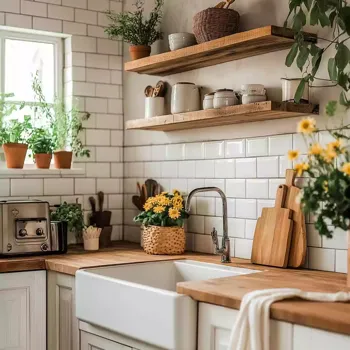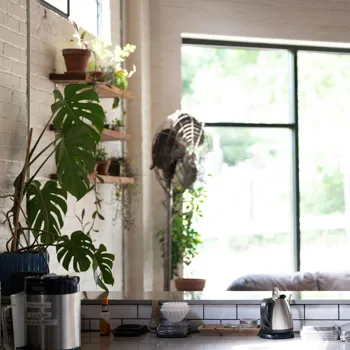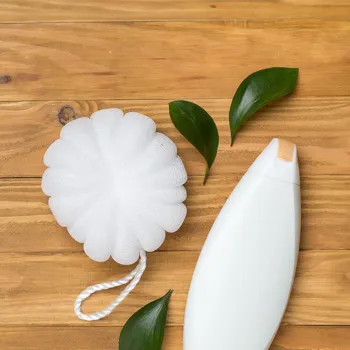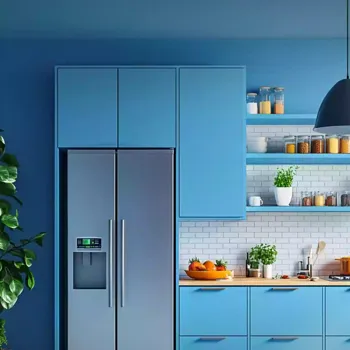Transform your kitchen into an eco-friendly haven! Discover 6 simple steps for a sustainable cooking space today!
Namaste, friends! Are you tired of seeing your garbage bin overflowing and feeling guilty
about the amount of plastic you use every day? Well, fret not! Turning your kitchen into a sustainable haven is easier than you think.

It's all about making small, mindful changes that can have a huge impact on the planet. Plus, it'll save you some money in the long run! Let's dive into six simple steps that will help you transform your cooking space into an eco-friendly zone, today!
Embrace the Magic of Composting
Imagine turning your kitchen scraps into nutrient-rich food for your plants! Composting is like magic, but it's actually science! It’s one of the best ways to reduce waste and create a fantastic resource for your garden or potted plants.
Instead of throwing away vegetable peels, fruit cores, tea bags, and coffee grounds, simply collect them in a compost bin. You can buy a ready-made composter or easily create one yourself using a bucket or container with some holes for ventilation.
Remember to layer your “greens” (like food scraps) with “browns” (like dried leaves, shredded paper, or cardboard) to maintain a healthy balance. In a few months, you’ll have a beautiful, dark compost that will make your plants thrive.
If you don't have a garden, you can donate your compost to a local community garden or even use it to enrich the soil of your potted plants. Embrace the composting journey and reduce the amount of waste sent to landfills, one scrap at a time.
Remember to avoid composting meat, dairy products, and oily foods, as these can attract pests and create unpleasant odors.
Say Goodbye to Single-Use Plastics
Plastic is a big problem. We see it everywhere, and it's harming our environment. Our kitchen is often a hotspot for single-use plastics like cling film, plastic bags, and disposable containers. But don't worry, there are plenty of eco-friendly alternatives!

Start by swapping out plastic wrap with reusable beeswax wraps or silicone lids to cover your leftovers. Instead of buying plastic bags for your groceries, invest in a set of sturdy, reusable cloth bags. And when it comes to storing food, opt for glass containers or stainless-steel tiffins.
These are not only better for the environment but also safer for your health, as they don't leach harmful chemicals into your food. Carry your own water bottle and say no to plastic water bottles.
By making these simple swaps, you can significantly reduce your plastic footprint and help protect our planet.
Shop Smart, Shop Local, Shop Seasonal
Where and how you buy your groceries can make a big difference. Think about it: buying produce wrapped in layers of plastic that has traveled miles to reach your plate is not exactly the most sustainable choice.
Instead, try to shop at local farmers' markets or directly from local farmers whenever possible. This reduces the carbon footprint associated with transportation and supports local businesses. Choose seasonal fruits and vegetables, as they require less energy to grow and are often more nutritious.
Plan your meals in advance and create a shopping list to avoid impulse buys and food waste. When shopping at the supermarket, look for products with minimal packaging or opt for unpackaged produce.
Water Conservation is Key
Water is precious, and we should use it wisely. Our kitchen is one of the places where we use a lot of water, from washing dishes to rinsing vegetables. To conserve water, start by fixing any leaky faucets or pipes. Even a small drip can waste a significant amount of water over time.

When washing dishes, don't let the water run continuously. Fill one sink with soapy water for washing and another with clean water for rinsing. Consider investing in a water-efficient dishwasher.
Avoid thawing frozen food under running water; instead, transfer it to the refrigerator the night before. When boiling vegetables, use just enough water to cover them, and save the nutrient-rich water for making soups or sauces.
By making these simple changes, you can conserve water and save money on your water bill.
Opt for Eco-Friendly Cleaning Products
Many conventional cleaning products contain harsh chemicals that can harm both the environment and your health. Fortunately, there are plenty of eco-friendly alternatives available.

Look for cleaning products that are biodegradable, plant-based, and free of harmful chemicals like phosphates, chlorine, and formaldehyde. You can also make your own cleaning solutions using simple ingredients like vinegar, baking soda, lemon juice, and essential oils.
Vinegar is a great natural cleaner and disinfectant, while baking soda can be used to scrub surfaces and deodorize your refrigerator. Lemon juice is a natural degreaser and can also be used to freshen up your kitchen.
Making your own cleaning products is not only better for the environment but also cheaper.
Energy Efficiency Matters
Your kitchen appliances consume a significant amount of energy. To reduce your energy consumption, start by using energy-efficient appliances. When buying new appliances, look for the BEE star rating, which indicates how energy-efficient an appliance is. Use your appliances wisely.

For example, avoid preheating your oven unless necessary, and unplug appliances when they're not in use. Use natural light whenever possible. Open your curtains or blinds to let the sunlight in, reducing the need for artificial lighting.
Clean your refrigerator coils regularly to ensure it's running efficiently. By making these simple changes, you can reduce your energy consumption and save money on your electricity bill.
By following these six simple steps, you can transform your kitchen into a sustainable haven.
Remember, small changes can make a big difference! Let's all do our part to protect our planet for future generations. Jai Hind!
AI Generated Content. Glance/InMobi shall have no liability for the content













